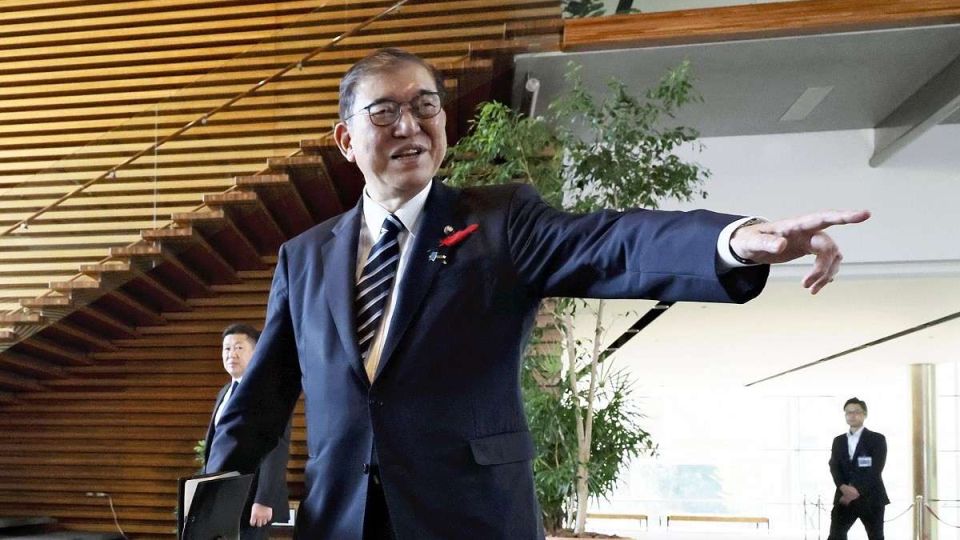October 4, 2024
TOKYO – The government and the ruling coalition parties are breathing a sigh of relief, as the latest nationwide opinion poll by The Yomiuri Shimbun found that more than 50% of respondents support the newly launched Cabinet of Prime Minister Shigeru Ishiba.
The Liberal Democratic Party’s support rate also increased, indicating a favorable impact from the lively debates among candidates in the LDP presidential election.
However, the figures are not quite good enough to represent a full “celebration” of the new Cabinet. As a result, concern still remains within the government and the ruling camp regarding the House of Representatives election set for Oct. 27.
Drawing public attention
Speaking about the survey results, LDP Policy Research Council Chairperson Itsunori Onodera on Wednesday expressed his determination to make the utmost effort to restore public trust in politics.
“The public has cast a stern eye toward the party, but [the survey results] show people’s hopes for reform,” Onodera said. “We will humbly accept the results and tackle political reform and economic pump-priming measures.”
Following the revelation of LDP factions’ violations of the Political Funds Control Law and other incidents, the approval rating of former Prime Minister Fumio Kishida’s Cabinet had been hovering in the 20% level since November last year.
In the latest survey, the LDP’s support rate also went up 7 points from the previous poll in September, indicating that the headwinds buffeting the party have eased to a certain degree.
“Given that the LDP was mired in a politics-and-money scandal, these figures should be welcomed,” said a LDP member who formerly held a cabinet post.
Ishiba has always ranked high in opinion polls asking who would be most suitable as the next prime minister. Therefore, the latest survey is believed to reflect public approval of his victory in the LDP presidential election.
Public attention was drawn to various aspects of the election, which had a 15-day official campaign period. A record high of nine candidates vied to lead the party, the largest number since 1972, when the endorsement of 20 LDP Diet members became a requirement to file one’s candidacy.
Ishiba, former economic security minister Sanae Takaichi and Shinjiro Koizumi, now head of the party’s Election Strategy Committee, fought a close race. Ishiba managed to win in a runoff even though he finished second in the first round of voting.
“[The favorable survey result] owes a lot to the ‘festival atmosphere’ of the presidential race,” said a junior LDP member from the now-defunct faction formerly led by late Prime Minister Shinzo Abe.
Will be able to keep force?
The prime minister announced a plan to dissolve the lower house on Oct. 9, only eight days after taking office, the shortest period since the end of World War II. Ishiba apparently intends to participate in campaigning, maintaining the current momentum.
“We hope [the new Cabinet] will manage to keep the same level of support for three more weeks,” said an executive of Komeito, the LDP’s junior coalition partner.
However, the Ishiba Cabinet’s support rate is not particularly high compared with previous cabinets’ approval ratings at their launch. Therefore, many LDP members are doubtful it will serve as a strong tailwind for the lower house election, in the words of one middle-ranking member.
Asked about Ishiba’s personnel appointments of Cabinet members and party executives, 43% of the respondents said they do not support them. Some believe that the personnel appointments worked to push down the Cabinet’s support rate.
The prime minister gave key positions to people close to him, which prompted a cynical remark from former LDP Policy Research Council Chairperson Koichi Hagiuda during an online program on Tuesday. “It looks like people who supported [the prime minister] in the party presidential election, his few friends and those had never assumed such posts, have been given key positions,” Hagiuda said.
Conflict continues
Sources of conflict remain within the LDP ahead of the lower house election. The biggest issue is whether the party should endorse former Abe faction lawmakers who made false entries in political funds reports in the funding scandal involving party factions.
If the party endorses such lawmakers on unclear grounds, it will draw public criticism and force the new administration to cope with a difficult situation. In addition, the Cabinet’s approval rating may drop sharply if newly appointed Cabinet members make gaffes or if scandals come to light and draw attacks from opposition parties.
Having long been viewed as an “opposition figure within the LDP,” Ishiba has stuck to his own positions, which has led to high public expectations of him.
During the campaign for LDP president, Ishiba stressed his intention to focus on Diet debates before dissolving the lower house. Therefore, he is now drawing criticism over the early dissolution from opposition parties, which claim that he suddenly changed his position.
“The LDP chose its new president as the ‘face for the election.’ He has to pay careful consideration to what he says until the lower house election is over,” a high-ranking government official said.

